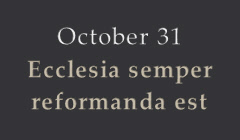Purity vs. Unity
From Faith Pulpit, Fall 2014. Used by permission, all rights reserved. (Continued from Lessons from the Reformation.)
Discussion
Books of Note - Preaching? and Theology of the Reformers
Preaching?: Simple Teaching on Simply Preaching by Alec Motyer
[amazon 1781911304 thumbnail]
“The Word of God is the constitutive reality at the heart of the Church” (p. 18).
There are as many ideas about how to grow a church as there are books on the subject. There are books that focus on meeting felt needs, worship strategies, small groups and a myriad of other ministries that can be maximized to grow your church. However, what many of these books fail to recognize or address is that the bedrock of growing a church is the ministry of the Word through preaching.
With a biblical focus on the Word of God at the heart of a church Alec Motyer has written Preaching?: Simple Teaching on Simply Preaching. As the Old Testament editor for The Bible Speaks Today series, Motyer has turned his pen to writing on preaching and has written a book that addresses both the biblical-theological aspects as well as some practical issues.
The first five chapters address the nature of preaching. These chapters are exegetically grounded in various passages of Scripture. Motyer defines good preaching as that which has a “sense of being plain and unmistakable” (p. 11). Preaching that is good is to be expositional, that is, “the restatement of a Scripture” (p. 30). Motyer wants to impress upon his readers that preaching is the ground upon which the whole church grows and functions. All ministry grows out of the Word and the preaching of the Word. His exegetical work deals with many NT passages that provide us with the nature and task of faithful biblical preachers. His observation, especially of the book of Acts, is that it is the ministry of the preaching of the Word that drove the growth of the early church. Surely there were other attending contributions, like the work of the Spirit through the Word, but it was always the Word that led the way and was responded to.
Discussion
The Creation Reformation
 Why should we celebrate October 31?
Why should we celebrate October 31?
For hundreds of years, people of the western world have attributed spiritual significance to the last day of October and the first day of November.
But “doctrines of demons” (1 Tim. 4:1, NKJV) governed the celebration of these days during the Dark Ages, until God brought light out of this darkness through the pen and voice of a humble monk and priest—Martin Luther.
Discussion
Book Review - Reformation Resources for Children
As a parent of six young children, I am constantly looking out for Christian resources to put in their hands. The Reformation in particular, is one of the pivotal moments in church history that has been sadly neglected today. More and more authors however, are now filling this gap and providing excellent books for our children.
Discussion
Book Review - Reformation Heroes for Children
With the renewed interest today in the Reformation, its history and theology, it is not surprising to find more and more books written for children that highlight some of the heroes and heroines of that era. What follows are two brief reviews of recent books devoted to lesser-known Reformation-era figures.



Discussion